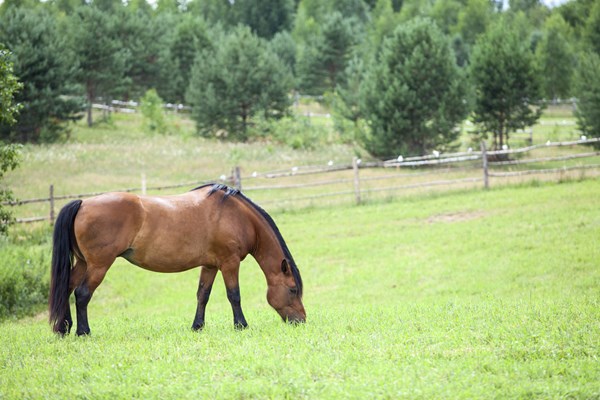 Credit: Thinkstock
Credit: Thinkstock“Fertilizer application should be evaluated according to your actual needs,” said Dr. Bob Coleman, State Extension Specialist at the University of Kentucky. “We typically fertilize so we can grow more total crop.From a pasture perspective, horse owners need to fertilize appropriately to grow the amount of forage needed.You don’t want to be faced with inadequate pasture, but you also don’t need to grow extra forage that would just have to be mowed.Making hay or clipping pastures might not be feasible in your situation,” he explained.
“In our region, fall fertilizer really helps thicken up the stand of grass,” said Coleman. “In the long run this will be a benefit, creating a healthier pasture.The bottom line however is growing what your horses can eat.”
“To fertilize appropriately, take some soil tests and sit down with your county agent to figure out what might be needed—to supply what your soils are lacking—and put on what you need, whether it is composted manure/barn bedding, commercial fertilizer or lime.The correct amount is crucial (not more nor less), and timing is also important,” he said.
“Think about how much grass your horses need and don’t try to over-produce on those pastures,” he advised. “The last thing you want to do is fertilize too much and have to spend time mowing to keep up with the grass so it won’t get too tall and rank for the horses to eat.Judicious use of fertilizer can help make sure you have enough grass but not too much.”
Some of the pastures in his area are Bermudagrass, and it’s sometimes a challenge to know how to manage/fertilize the grass just right, so it is just keeping ahead of the horses.“What you can grow, and the growth rate, will be highly variable, depending on climate/rainfall etc. where you live, and what a typical summer might be,” he explained.
Your county extension agent will have the knowledge about how to grow grass in your region and which fertilizers will work the best.“All too often a horse owner just uses what the neighbor uses or what he/she reads about in an article or book, but it may not be the proper type, amount or timing for your own pastures,” noted Coleman. “Timing is important to enhance root growth and over-all capacity of the plant rather than just more top growth.
“In some environmental conditions, it’s ok to spread fertilizer in the spring to get a flush of new grass, similar to what people do with their lawns.If you want to stimulate root growth and create a thicker, healthier stand, however, it is often best to apply the fertilizer in the fall.Check with your county agent for advice to fit your specific conditions and soils.All too often people use a general calculation for what type and amount of fertilizer to use and it might not be appropriate for their own situation.”


